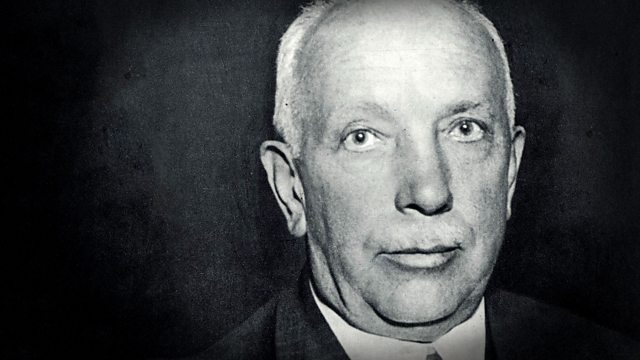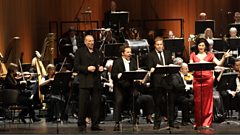
Strauss 150 - Capriccio
From the Royal Opera House, Covent Garden, a performance of Strauss's last opera, Capriccio, starring Renee Fleming. Andrew Davis conducts.
Richard Strauss 150
Radio 3's celebrations of the 150th anniversary of his birth, Renée Fleming sings the role of the Countess Madeleine in a concert performance of Strauss's last opera conducted by Andrew Davis, recorded at the Royal Opera House Covent Garden. Presented by Louise Fryer with contributions from the cast and conductor. There'll also be a Radio 3 Opera Guide on the piece which listeners can download.
Capriccio dramatises the perennial question: which is more important in opera - words or music? The composer Flamand and the poet Olivier both compete for the affection of the Countess, while the seasoned director La Roche brings a sense of reality and pragmatism to the proceedings. Strauss lavished a wealth of operatic experience on this late bloom of his indian summer, ending with a celebrated solo scene for the Countess which crowns a life-long love affair with the soprano voice.
The Countess.....Renée Fleming (Soprano)
Clairon.....Tanja Ariane Baumgartner (Mezzo-soprano)
Flamand.....Andrew Staples (Tenor)
Olivier.....Christian Gerhaher (Baritone)
The Count.....Boje Skovhus (Baritone)
La Roche.....Peter Rose (Bass)
Italian Singer.....Mary Plazas (Soprano)
Italian Singer.....Barry Banks (Tenor)
Royal Opera House Orchestra
Andrew Davis (Conductor)
First broadcast in January 2014.
Last on
More episodes
Previous
Synopsis
The Countess Madeleine’s château near Paris, around 1775
Ìý
Guests are gathered at Countess Madeleine’s château to discuss planned celebrations for her forthcoming birthday.Ìý The Countess listens to a string sextet written by the young composer Flamand, watched by Flamand and by the poet Olivier, his rival for the Countess’s affections. The theatre director La Roche dozes in a chair. Flamand and Olivier banter about words, music and their shared passion for the Countess. La Roche wakes up and the three chat about the aesthetics of opera and drama, then leave to work in the C ountess’s theatre. The Countess teases her brother the Count about his love of acting and of the beautiful actress Clairon, with whom he plans to star in a play written by Olivier and directed by La Roche. The Count in return gently mocks his sister’s obsession with music, and asks if she can make a choice between her two suitors Olivier and Flamand. Clairon arrives to rehearse with the Count, and they read through a dramatic scene, ending with an impassioned sonnet recited by the Count.
Ìý
La Roche orders them away to rehearse with him in theÌý heatre, and Olivier himself recites the sonnet, as a declaration of his love for the Countess. Flamand decides he will set the sonnet to music and hurries off to compose. Olivier presses the Countess to tell him how she feels about him and which she prefers – poetry or music – but she hesitates.
Ìý
Flamand comes back and performs his sonnet. The Countess enthuses about the wonderful combination of words and music, but Olivier grumbles that Flamand has ruined the scansion of his poem. La Roche calls Olivier away to discuss a problem with his script, and Flamand uses the poet’s absence as a chance to declare his love for the Countess, and to ask her the same question as Olivier – which does she prefer, poetry or
music? The Countess promises to meet him in the library the next morning at 11am, when she will give him her answer.
Ìý
The Count returns from rehearsal, declaring himselfÌý bewitched by Clairon. The Countess tells him about her two suitors and her reluctance to choose between them. Brother and sister banter affectionately.
Everyone gathers to drink chocolate in the salon. La Roche organizes a selection of entertainments for the Count and Countess. First, a dancer performs three dances, while the Count, Countess, Flamand, Olivier, Clairon and La Roche discuss the various merits of dance, music and poetry, and the Count reflects on the absurdity of opera. Then, an Italian soprano and tenor perform an elaborate duet. As they end, La Roche declares that he plans to stage a grand mythological epic to celebrate Countess Madeleine’s birthday.
The show will be in two parts: ‘The Birth of Pallas Athene’ and ‘The Fall of Carthage’.
Ìý
The others mock his grandiose ideas. Hurt, La Roche makes an impassioned speech in praise of the theatre director, who can rescue many an indifferent play or opera. La Roche challenges Flamand and Olivier to write an opera revealing human beings in all their complexity. The group discuss various potential subjects and finally agree to use the one suggested by the Count: Flamand and Olivier will ‘write an opera about us and the eventsof today’.
Ìý
As twilight falls the guests depart for Paris, and the servants tidy the room. They mock their employers for their theatrical enthusiasms, talk about their own interests in theatre and joke about the Count and Countess’s romantic intrigues. The prompter, Monsieur Taupe, is rescued from the prompt box where he has been asleep. The Major-Domo listens patiently as Monsieur Taupe tells him that the most important person in a show is really him, and suggests he comes to the kitchen to enjoy some refreshment while the carriage is prepared to take him back to Paris.
Ìý
The Countess returns, pensive, and is told by the Major-Domo that her brother has gone with Clairon to Paris. The Major-Domo also brings a message from Olivier: the Countess must meet him in the library at 11am the next morning to tell him know how the new opera will end.
Ìý
Alone, the Countess attempts both to choose the end of the opera, and to decide which of her suitors she prefers, with little success. She sings Flamand’s sonnet, and meditates on the magical fusion of words and music. At last, dreamily looking at herself in the mirror, she asks ‘Is there any ending that isn’t trivial?’. The Major-Domo announces that dinner is served and the Countess, still undecided, smiles at her reflection and leaves the room.
Broadcasts
- Sat 4 Jan 2014 19:30Â鶹ԼÅÄ Radio 3
- Mon 10 Nov 2014 19:15Â鶹ԼÅÄ Radio 3


